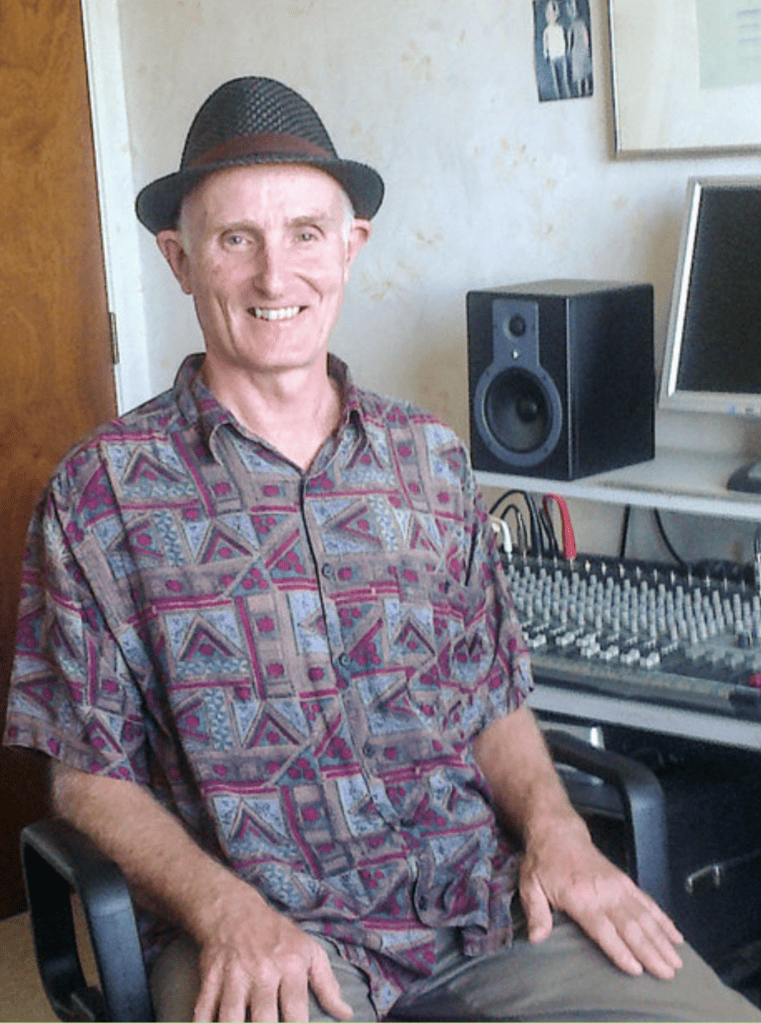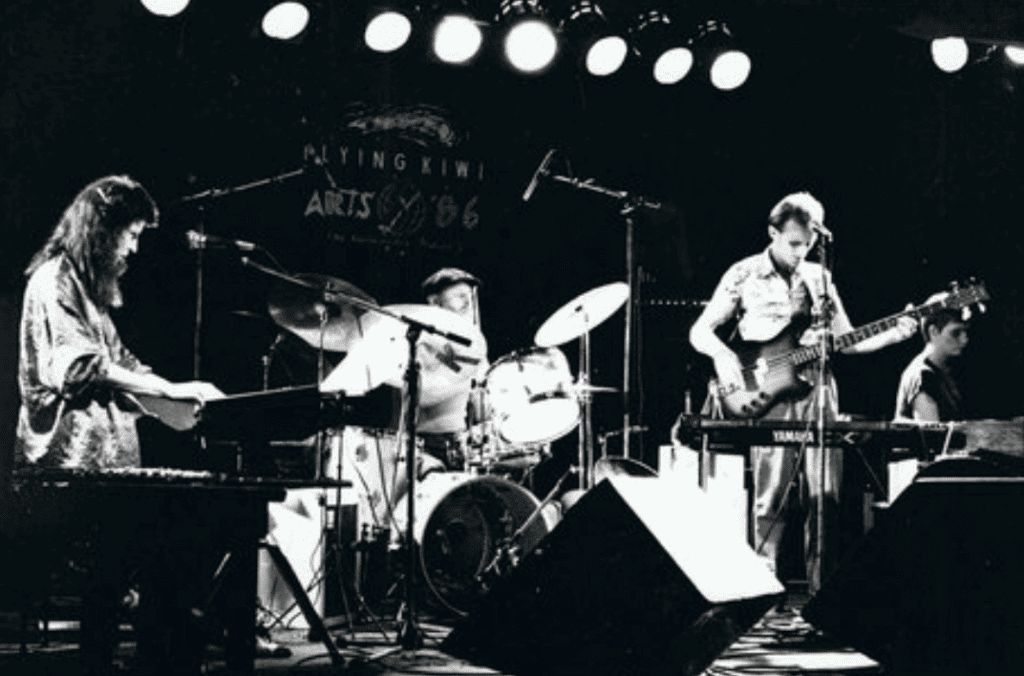Low Profile’s Elephunkin’ is one of the most fondly remembered Kiwi songs of the 1980s, but what has Phil Bowering been up to since then? With no less than three new albums out, we figured it was time for a big catch-up.
 Gary Steel – Well, let’s assume that the majority of people reading this are fans and admirers who enjoyed your Low Profile work in the 1980s, and are curious to know why for so long there has been No Profile! It’s probably next to impossible to summarise several decades in a few short sentences, but could you give our readers some idea of why the long absence, and what you got up to while you were away?
Gary Steel – Well, let’s assume that the majority of people reading this are fans and admirers who enjoyed your Low Profile work in the 1980s, and are curious to know why for so long there has been No Profile! It’s probably next to impossible to summarise several decades in a few short sentences, but could you give our readers some idea of why the long absence, and what you got up to while you were away?
Phil Bowering – In 1990 I left New Zealand, travelling in the USA, then through Europe to Egypt, and ended up in London, where I worked mainly in desktop publishing and graphic design, played in bands, wrote, recorded and got into permaculture. While in the UK I also travelled around Britain, visiting many ancient sites, and played at Glastonbury Festival. On returning to New Zealand, I made very little progress with my music, and after living in Auckland in the late ‘90s I moved back to Taranaki and started investing in recording gear. The release of Psychedelia Grooves in 2004 was followed by a long stint on a rural property managed according to permaculture principles where I also did a lot of recording, and this continued on in New Plymouth where I lived until 2022.
Gary – There’s probably a perception that NZ musicians are able to do what they do full time, when in fact most have “another career” as well as other interests. Is this true in your case?
Phil – Yes. I wouldn’t say another career as such, but over the years I’ve certainly undertaken a lot of work outside the music industry and related fields, like teaching, in order to make ends meet and to finance recording projects.

Gary – There are four long Potent Brew albums from this century for people to explore, the last three of which have followed quickly on from each other in 2021, 2022 and 2023. Why the sudden outpouring?
Phil – Over the past few years I’ve had to contend with a number of serious health issues and, faced with my own mortality and with the prospect of declining capabilities, I decided to start putting some of the recordings out while I still could.
Support Witchdoctor’s ongoing mission to bring a wealth of new and historic music interviews, features and reviews to you this month (and all year round) as well as coverage of quality brand new, contemporary NZ and international music. Witchdoctor, entertainment for grownups. Your one-off (or monthly) $5 or $10 donation will support Witchdoctor.co.nz. and help us keep producing quality content. It’s really easy to donate, just click the ‘Become a supporter’ button below.
Gary – What would you say is the defining difference between your earlier music and these latest releases?
Phil – My best known earlier music was a spontaneous and exploratory collaboration with Steve Garden that ultimately became more song based, whereas the latest releases are entirely instrumental. The influences of African and Latin American music are more evident now and there’s also more of an overt nod to (German record label) ECM, jazz and jazz-rock fusion in some of the compositions that perhaps wasn’t so obvious before. In quite a few of the compositions I’ve left gaps in the bass lines to enable the grooves to breathe more, so that what’s played and where it’s played is more important, like the way the percussion parts interact.
 Gary – You refer to the word ‘psychedelia’ quite a lot. Is this all about shaping one’s sense of the world and the transformative potential of music to see different realities?
Gary – You refer to the word ‘psychedelia’ quite a lot. Is this all about shaping one’s sense of the world and the transformative potential of music to see different realities?
Phil –There’s a lot of carefully researched information about psychedelia on my website, potentbrew.com. Briefly, the role of psychedelic or mind-manifesting substances in shaping our sense of the world has not been fully explored because many psychedelics were made illegal during the ‘60s when their use was widespread and primarily recreational rather than therapeutic, Shamanic or spiritual. The sonic and musical invention which transformed pop music in the ‘60s and ‘70s can be attributed to the influence of some of these substances, and they could still play a useful role in bringing about changes of consciousness or a paradigm shift, because they dissolve boundaries and are capable of producing profound and dramatic changes in perception. Music’s transformative potential lies in its ability to express different orders of reality and to inspire and uplift us into higher states of awareness, to the extent that musicians are able to “be there” or have “been there” already.
Gary – One characteristic of the Potent Brew albums is the sense that these were largely the focused work of an individual overdubbing various layers of both organic instruments and programmed layers. Is this assumption correct? Is it mostly you in your studio, or are there other musicians/collaborators involved?
Phil – There were other musicians on Psychedelia Grooves but most of the Potent Brew recordings made since then have resulted from me beavering away at home on my own.
Gary – There’s always been what I can only describe as an anarchic spirit running through your work, a rebellion against the system. There’s an awful perception amongst the young that boomers have all betrayed their belief in change for good and accepted the fruits of capitalism. How have your views evolved, and would you say that your deviation from the norms has contributed to the way you’ve gone about things with the Potent Brew albums?
 Phil – I’m now more inclined to see things evolving organically rather than seeing enduring changes taking place through revolution, although I do still think that transformational change is dependent on what I’d call a revolution of consciousness. With Potent Brew I did deliberately set out to be provocative because when I came back to New Zealand, I found myself having to confront the kind of parochial and conformist mindsets that had driven me away in the first place. I feel that a lot of the outspoken and anti-establishment views that I first espoused in the ‘80s are still relevant, as what Robert Hughes called stagnant orthodoxy has largely prevailed since then, and many complex and pressing problems, some of which have been decades in the making, remain unaddressed.
Phil – I’m now more inclined to see things evolving organically rather than seeing enduring changes taking place through revolution, although I do still think that transformational change is dependent on what I’d call a revolution of consciousness. With Potent Brew I did deliberately set out to be provocative because when I came back to New Zealand, I found myself having to confront the kind of parochial and conformist mindsets that had driven me away in the first place. I feel that a lot of the outspoken and anti-establishment views that I first espoused in the ‘80s are still relevant, as what Robert Hughes called stagnant orthodoxy has largely prevailed since then, and many complex and pressing problems, some of which have been decades in the making, remain unaddressed.
Gary – The new album, A Strange New World, more so than previous releases, seems to mix almost (so-called) new age elements with dub-reggae, jazz and world music styles. Were you consciously aware of the new age feel on some tracks?
Phil – While I don’t really like the term new age, I did include some tracks with more subtle and spacious feels as well as tracks which have quite busy feels on the new album. The juxtaposition of elements that wouldn’t ordinarily be found together has always been a part of the Potent Brew ethos and this album is no different in that respect, although each Potent Brew album has its own flavour. The intention is that people can make connections for themselves when they listen to this music.
 Gary – Without going into mind-bending technical detail, could you give a brief exposition on the kind of gear/technology/instrumentation you used on A Strange New World, and how (or if) that differs a lot from the previous Potent Brew releases?
Gary – Without going into mind-bending technical detail, could you give a brief exposition on the kind of gear/technology/instrumentation you used on A Strange New World, and how (or if) that differs a lot from the previous Potent Brew releases?
Phil – The album was recorded and mixed on a ProTools 8 channel I/O system using a Yamaha MX20/6 mixing desk, Yamaha and Roland synths, an E-mu Vintage Keys synth module, a Maton JB-4 bass, electric and acoustic guitars, congas, djembe, doumbek and darbuka, as well as sequenced percussion. The guitars and sometimes the bass and other parts were run through a Zoom 9050 multi-effects processor and the rest of the effects are software plug ins. My main speakers for recording and mixing are active M-Audio BX5a near field monitors.
Gary – How would you say the Moving Lines II project From Source To Sea differs from Potent Brew, and do you see it as having equal importance or as more of a side project?
Phil – Well, Moving Lines as identity goes back to the ‘80s and has always involved other musicians. Moving Lines I was released in 1987 and some of the compositions on From Source To Sea were first explored before that in Cultural Affairs, an ensemble which included the late Jonathan Besser (RIP). So, From Source To Sea is the continuation of a longstanding strand in my work which is now essentially completed. I started developing Potent Brew in the ‘90s on returning to New Zealand with a different perspective on my life and cultural heritage. I wanted to get back to the spontaneous, exploratory and satirical spirit which informed the best of my earlier work and decided then that I needed a new umbrella for what I wanted to do with my music. Potent Brew also became my website. Both projects draw on a range of musical elements, including strong rhythmic elements, so there are a lot of similarities between them, and I don’t see one as being more important than the other.
Gary – There’s quite a pronounced spiritual aspect to these projects. Do you have firm beliefs in the spiritual realm?
Phil – The soul’s journey has been a major theme in my work for a long time and the spiritual aspects of life like love and kindness have become more important to me as I’ve got older. To some the spiritual realm might seem like a strange new world, while others believe that there is no such thing. I’m not trying to convert others to my point of view, as what I believe can’t really be quantified, and is not as important as how I try to live my life.

Gary – If someone was to try and get to a good feeling for what your musical persona is all about, what should they explore first?
Phil – I’d start with something like ‘Small Town Noise’. There’s an mp3 remix on my website under Sounds. Samples of a range of other Potent Brew tracks are available on this page.
Gary – Would you mind naming a few of your favourite artists and albums?
Phil – A lot of my favourite artists record on the ECM label. An ECM favourite is Eberhard Weber’s Yellow Fields. Then there’s Herbie Hancock’s Thrust, Brian Eno’s Apollo, Salif Keita’s Amen and Tortoise’s TNT. Unsurprisingly, I have multiple albums of all these artists.
Note: Phil is going through some major health challenges at the moment, and we’d like to wish him well. In an often fatuous and superficial industry, Phil has often been a beacon of deep thinking and thoughtful conversation. If you’d like to check out his music, you’ll find it here: potentbrew.com or on compact disc at Wellington’s Slow Boat Records. There are plans to make his releases available both digitally and on compact disc through Bandcamp.
Phil’s latest Potent Brew releases are: Electric Fire (2021), Vision Quest (2022) and A Strange New World (2023). In addition, there’s Moving Lines II – From Source To Sea (2023) and Colleen Carter’s New Horizon (2022), which features Phil’s playing and production skills.
You can read more about Phil’s history at https://www.audioculture.co.nz/profile/phil-bowering and on Witchdoctor at https://www.witchdoctor.co.nz/index.php/2023/05/forty-years-ago-philbo-keeps-a-low-profile/ and https://www.witchdoctor.co.nz/index.php/2013/05/philbolow-profile/














